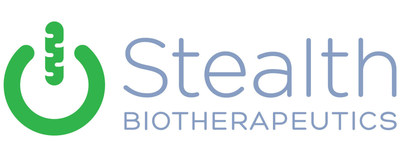Stealth BioTherapeutics (NASDAQ: MITO), a clinical-stage biotechnology company focused on the discovery, development and commercialization of novel therapies for diseases involving mitochondrial dysfunction, announced the presentation of pre-clinical data for its lead pipeline compound, SBT-272, at the 18th Annual Northeast Amyotrophic Lateral Sclerosis Consortium in Clearwater Beach, Fla.
|
BOSTON, Oct. 7, 2019 /PRNewswire/ -- Stealth BioTherapeutics (NASDAQ: MITO), a clinical-stage biotechnology company focused on the discovery, development and commercialization of novel therapies for diseases involving mitochondrial dysfunction, announced the presentation of pre-clinical data for its lead pipeline compound, SBT-272, at the 18th Annual Northeast Amyotrophic Lateral Sclerosis Consortium in Clearwater Beach, Fla. The data showed that treatment with SBT-272 was associated with a dose-dependent delay in the onset of neurological disease, a reduction in systemic markers of neurodegeneration and prolonged lifespan in a mouse model of amyotrophic lateral sclerosis (ALS). SBT-272, a mitochondrial targeting investigational molecule in pre-clinical development for the treatment of rare neurodegenerative diseases involving mitochondrial dysfunction, is expected to advance into Phase 1 first-in-man safety studies by year-end.
ALS is a progressive neurodegenerative disease characterized by motor neuron deterioration and muscle atrophy. Mitochondrial dysfunction is believed to contribute to the progression of ALS. "We are committed to developing therapies to address the significant unmet medical needs of patients affected by rare neurodegenerative diseases entailing mitochondrial dysfunction," said Chief Executive Officer Reenie McCarthy. "We are encouraged by these early signals suggesting that mitochondrial medicine may be a promising avenue for the treatment of ALS, and are working diligently to progress SBT-272 into the clinic later this year to evaluate its safety ahead of anticipated efficacy studies. We are especially pleased to have identified a responsive biomarker, which may help to inform our development efforts." In the study, 60 ALS model mice were randomized to daily intraperitoneal injections of placebo, 0.5 mg/kg of SBT-272 or 5.0 mg/kg of SBT-272 for up to 10 weeks. The 10 male mice treated with the higher dose of SBT-272 demonstrated a statistically significant delay in the onset of neurological symptoms and increase in lifespan compared with male mice treated with placebo. Statistically significant reductions in circulating plasma levels of neurofilament light chain—a biomarker of nerve damage—were also noted with the 5.0 mg dose versus placebo. Significant differences were not seen with SBT-272 versus placebo in the female mice, which are known to present with a milder phenotype and lower levels of neurofilament light chain. Stealth plans to initiate a first-time-in-human Phase 1 clinical trial of SBT-272 by the end of this year. For additional information on SBT-272, please refer to Stealth's website. About Amyotrophic Lateral Sclerosis (ALS) About Stealth Media Relations Investor Relations
SOURCE Stealth BioTherapeutics |
||
Company Codes: NASDAQ-NMS:MITO |





